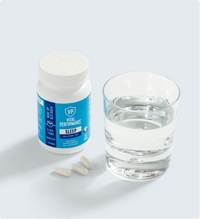There's absolutely nothing wrong with positivity— it can bring optimism into your life and genuinely make you feel happy. That being said, you shouldn't have to put on a pair of rose colored glasses and pretend that everything's okay when it isn't.
Toxic positivity is a tendency to only focus on the bright side while pushing away any feelings that could be uncomfortable— and in this case — it can bring more harm than good. We recently spoke with a few seasoned psychologists on the subject, so keep scrolling to read more about toxic positivity and how to navigate it.
What exactly is toxic positivity?
You may be wondering what exactly toxic positivity means and why being so positive can have damaging effects.Dr. Carla Marie Manly, clinical psychologist, speaker, and author of both Joy From Fear and Date Smart (out July 2021), explains that toxic positivity involvespretendingto be perpetually happy.
"Unlike authentic positivity that naturally ebbs and flows— and allows for a range of other emotions — toxic positivity avoids and hides 'negative' thoughts and feelings," she says. "No emotion is 'negative,' but we surely can use our emotions in negative ways — in this instance, toxic positivity is a negative iteration of the pure state of joy."
Toxic positivity is when we reflexively disregard information that is "frustrating, disappointing, or otherwise unfavorable because we are unable or unwilling to accept reality," adds Dr. Chloe Carmichael, clinical psychologist and author of Nervous Energy: Harness the Power of your Anxiety.

What are some examples of toxic positivity?
Toxic positivity can manifest in a wide variety of ways. "From taking medication to feel chronically upbeat to fearing that others won’t like you if you express your true feelings, toxic positivity eliminates the natural range of human emotions," Manly tells Lively.
Toxic positivity also manifests through a pressure to "be perfect, look perfect and live a perfect life," and promotes an addiction to perfection that delegitimizes our natural quirks and imperfections. This can commonly be seen on social media — through the careful curation of perfect images, many platforms promote an idealized version of reality that contributes to toxic positivity, Manly explains.
"This compulsion to push happiness and positivity deprives us of the healthy changes that an unfavorable reality would otherwise stimulate us to make," adds Carmichael. "For example, a person with toxic positivity might return repeatedly to an abusive relationship because 'I want to focus on his positive aspects and hold hope that he will change.'"
Another example might be running up large credit card bills on frivolous items because you're "staying positive" about your future.
Related Articles
Why is taking positivity to such an extreme harmful?
It's no longer healthy when positivity becomes forceful or delegitimizes other feelings. Manly explains that we have five core emotions — joy, sadness, anger, fear, and disgust, and that each emotion has a positive role to play in the psyche.
"The diminishment or emphasis of any particular emotional state creates psychological stress — toxic positivity is a perversion of the naturally evanescent emotional state ofjoy; simply put, false positivity isnot good for the soul," she says. "The pressure to be continually 'happy' and 'positive' can trigger or worsen existing mental health conditions such as anxiety and depression; by masking underlying issues for the outside world, an 'emotional crash' can occur behind closed doors."
Yvonne Thomas, Ph.D., a Los-Angeles based psychologist whose specialties include relationships and self-esteem, seconds that it’s harmful because you’re subconsciously shutting down all of who you are and you simply don't have that full spectrum of emotions available to you. "Toxic positivity can also put a real strain on relationships because if you tend toonlyhighlight the bright side, the other person may not feel heard or taken seriously," she says.
Furthermore, this repression of feelings can end up manifesting cognitively, physically, and emotionally. "Cognitively speaking, if you have a tendency for toxic positivity, you're not seeing things accurately and you end up living in quite an 'all or nothing' world which takes up a ton of energy because you're constantly trying to convince yourself things are great, when in reality, they're quite the opposite," she explains.
Physically, you can wind up with ailments like muscle tension, headaches, sleeping issues and more from having such a build-up of feelings, and emotionally, you might feel quite stressed or on edge, adds Thomas.

tips for dealing with toxic positivity from someone in your life (or yourself)?
If you notice that you're being affected by someone who suffers from toxic positivity, Manly says you may wish to distance yourself from this energy and give yourself frequent, intentional breaks. She adds that if the individual is someone close to you, it might feel appropriate to have an "honest, kind conversation about what you’re noticing and how it affects you."
Carmichael agrees, suggesting that if someone in your life seems to be lapsing into toxic positivity to the point of denying important information such as allowing people to mistreat them and/or other self-sabotaging behaviors, you can try to share your perspective by telling them their positivity may be verging on denial. "Be gentle, and emphasize that you’re mentioning this only because you care and worry they may be setting themselves up for pain if they don't register certain signs of trouble — however, you must remember that it's ultimately their life to live," she advises.
If you notice that toxic positivity is at work in your own life, Dr. Manly has a handful of great tips: simply notice when a pressure to be "happy" or "positive" arises and don’t judge yourself, justnoticethe internal or external pressure; give yourself clear permission to feel blue, sad, anxious, mad, and irritable; allow yourself plenty of downtime to "just be" in whatever natural state arises for you, and while positivity may bubble up, it's important to make space for other feelings; give yourself a break from people, situations, and social media that trigger what she calls "the toxic voice of comparison," and offer yourself plenty of affirmations that allow you to embrace all of who you are — your quirks, imperfections, and "non-positive" ways.
Finally, Thomas notes you may wish to partake in therapy if you have a tendency for toxic positivity to work through why this may be the case. She, too, recommends the tactic of trying to withstand and tolerate emotions or feelings that go beyond positivity — even if initially it's just for five minutes.
"It's important to remember that progress does not always feel good — it's work and it may not feel comfortable, but just because it may feel unnatural doesn't mean it’s wrong or bad, in fact, it means that you are growing and learning to break a pattern of being conditioned."

















